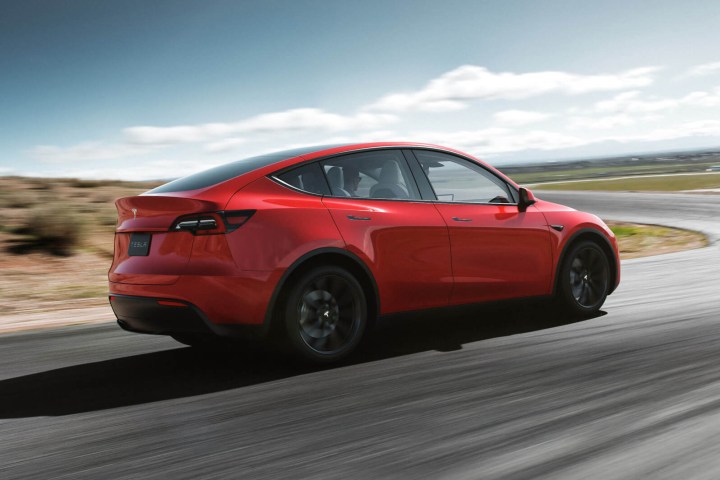Electric cars may be getting cheaper, but they’re still not cheap. As such, many potential customers hope to factor in the up-to-$7,500 federal electric vehicle tax credit as a way to soften the blow of buying a new car.
But the federal EV tax credit has gone through a number if iterations, and it doesn’t last forever. Not only that, but as it turns out, many electric cars simply aren’t eligible for the credit, and it’s important to keep that in mind if you plan on buying an electric car in the near future.
Curious to find out if your next car qualifies for the EV tax credit? Here’s what you need to know.
What are the requirements of the credit?

To qualify for the federal EV tax credit, cars and manufacturers have to satisfy a number of requirements.
For starters, buyers may only qualify for the full $7,500 EV tax credit if they buy a new car. Buyers of used electric cars can still get a credit, but it’s limited to $4,000 instead.
Other requirements have to also be met. To be eligible for $3,750 of the credit, 40% of the battery minerals must come from the U.S. or countries with a free trade agreement with the U.S. That will increase to 60% in 2024, 70% in 2026, 80% in 2027, 90% in 2028, and 100% in 2029. And in 2025, cars with any battery minerals or components from countries of concern will be excluded from the credit.
The other half of the credit depends on whether or not the battery was assembled or manufactured in the U.S. For 2023, 50% of it has to be manufactured in the U.S., with that number increasing to 60% starting in 2024, 70% in 2026, 80% in 2027, 90% in 2028, and 100% in 2029.
There is a price cap, too, which differs based on the type of vehicle. Trucks, vans, and SUVs may cost no more than $80,000 — all other cars must be $55,000 or less.
There’s also an income limit. Buyers can use the modified adjusted gross income from the year the car was delivered, or the year before. When it comes to new cars, for single filers, it cannot exceed $150,000. For heads of household, it can’t exceed $225,000. For married couples filing jointly, it can’t exceed $300,000. And, for married couples filing separately, it can’t exceed $150,000. Those figures are exactly halved for buyers of used EVs.
Unfortunately, it’s still not as simple as getting a flat credit on your taxes. The credit you’ll get actually depends on how much you owe in income taxes for the year. If, for example, you bought a qualifying vehicle and only owed $2,000 on your income taxes for the year, you would only get $2,000. The rest will not count toward a refund, or toward next year’s taxes. If you don’t owe anything, don’t expect anything (related: ERTC).
Cars that still qualify

While we can’t help you find out if your income meets the requirements for the EV tax credit, we can help you determine if individual cars still qualify. Here’s a list of the cars that qualified for the federal tax credit at the time of this writing. Remember the MSRP limits though — many of the cars on this list could tip over the price limit if you choose a premium trim level or select too many upgrades. This list is subject to change, so it may be worth double-checking if the car you’re buying qualifies by heading to fueleconomy.gov.
BMW
- 2024 X5 xDrive50e plug-in hybrid 2024
- Up to $3,750 credit
- Up to $80,000 MSRP
Cadillac
- 2023-2024 Lyriq
- Up to $7,500 credit
- Up to $80,000 MSRP
Chevrolet
- 2024 Blazer EV
- Up to $7,500 credit
- Up to $55,000 MSRP
- 2022-2023 Bolt EV
- Up to $7,500 credit
- Up to $55,000 MSRP
- 2022-2024 Bolt EUV
- Up to $7,500 credit
- Up to $55,000 MSRP
- 2024 Equinox EV
- Up to $7,500 credit
- Up to $55,000 MSRP
- 2024 Silverado EV
- Up to $7,500 credit
- Up to $80,000 MSRP
Chrysler
- 2022-2023 Pacifica plug-in hybrid
- Up to $7,500 credit
- Up to $80,000 MSRP
Ford
- 2022-2023 Escape plug-in hybrid
- Up to $3,750 credit
- Up to $80,000 MSRP
- 2022-2023 F-150 Lightning
- Up to $7,500 credit
- Up to $80,000 MSRP
- 2022-2023 Mustang Mach-E
- Up to $3,750 credit
- Up to $80,000 MSRP
- 2022-2023 E-Transit
- Up to $3,750 credit
- Up to $80,000 MSRP
Jeep
- 2022-2023 Grand Cherokee 4xe plug-in hybrid
- Up to $3,750 credit
- Up to $80,000 MSRP
- 2022-2023 Wrangler 4xe plug-in hybrid
- Up to $3,750 credit
- Up to $80,000 MSRP
Lincoln
- 2022-2023 Aviator Grand Touring plug-in hybrid
- Up to $7,500 credit
- Up to $80,000 MSRP
- 2022-2023 Corsair Grand Touring plug-in hybrid
- Up to $7,500 credit
- Up to $80,000 MSRP
Rivian
- 2023 R1T
- Up to $3,750 credit
- Up to $80,000 MSRP
- 2023 R1S
- Up to $3,750 credit
- Up to $80,000 MSRP
Tesla
- 2022-2023 Model 3
- Up to $7,500 credit
- Up to $55,000 MSRP
- 2022-2023 Model Y
- Up to $7,500 credit
- Up to $80,000 MSRP
Volkswagen
- 2023 ID.4
- Up to $7,500 credit
- Up to $80,000 MSRP



